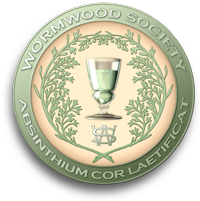Absinthe in the US - Is It Real? - Reviewed by Experts and Consumers at The Wormwood Society
Is it absinthe, or is it a marketing gimmick? Yes and no. It pays to do some research.
Absinthe in the US - Is It Real?
 As the media continues to make hash of absinthe's return to the US and erroneously report overturned rules and repealed bans, we hope to help clarify what happened and help you make an informed decision.
As the media continues to make hash of absinthe's return to the US and erroneously report overturned rules and repealed bans, we hope to help clarify what happened and help you make an informed decision.
Which ones are authentic absinthe, which ones are marketing gimmicks, and how can you tell the difference?
 While journalists have had fun with the same old puns and the standard litany of famous absinthe drinking artists and writers, they have also reported as many as five new absinthes since the re-approval of absinthe in the US. Unfortunately, not all of these products are made with Grand Wormwood: Artemisia absinthium, which is the defining ingredient of absinthe.
While journalists have had fun with the same old puns and the standard litany of famous absinthe drinking artists and writers, they have also reported as many as five new absinthes since the re-approval of absinthe in the US. Unfortunately, not all of these products are made with Grand Wormwood: Artemisia absinthium, which is the defining ingredient of absinthe.
These spirits may be enjoyable in their own right, but I'm not addressing their merits in terms of quality or flavor, only whether they qualify as absinthe, historical or otherwise, at the most basic level.
No Legal Definition At this time there is no class designation for absinthe in the US. That means there is no legal definition or minimum requirements for calling a product "absinthe". As far as the government is concerned, "absinthe" is just a fanciful term to put on a label.
Theoretically one could—as has been done in other countries for years—offer colored, flavored vodka as absinthe; in fact, one brand has already done just that.
If a product specifically states that it contains a particular ingredient, such as Artemisia absinthium wormwood, you can be sure it's in there, at least in some amount. The TTB is very strict about deceptive labeling and requires samples, formulas, and manufacturing processes for every absinthe-related product before approving it. But listing specific ingredients is not required, so the lack of a legal definition leaves you with no assurance of what you're buying.
So, which of these new products qualifies as authentic absinthe like was drunk in the old days? That depends on your criteria for authenticity.
Strict Criteria
Although until recently the information was obscure except to those who searched for it diligently, history has preserved the identity of absinthe quite well.
The Wormwood Society criteria are based strictly on the known historical character and contents of absinthe as recorded in contemporary writings, distillation treatises and recipes, photographs and art, as well as the many samples of genuine pre-ban, vintage absinthe which have been discovered, analyzed and tasted. These include some of the most well-known premium brands of the time: Pernod Fils, Edouard Pernod, Berger, Bazinet, Premier Fils and others.
While aficionados argue the finer points of identity, the bottom line is that thousands of pieces of evidence indicate that absinthe is, and always was: a distilled, high-proof spirit flavored primarily with Artemisia absinthium wormwood and anise. There is no evidence that there was ever any other kind.
Like Ouzo, Arak, Raki and others, it is an anise spirit. Anise is usually associated with the "licorice" flavor, but unlike these other spirits, absinthe should also contain enough wormwood and other herbs to balance the flavor and aroma.
The most basic features to look for:
• Must be made with Artemisia absinthium wormwood, not just any "Artemisia" or "wormwood". There are over a hundred species of Artemisia, many of which are nick-named wormwood. Absinthe requires absinthium, and the only guarantee at the moment is that the label specifically states that the product is made with it.
• Must have a notable flavor of anise (licorice-like), augmented with the wormwood and other botanicals. How strong the anise flavor is will be a matter of the maker's style, but any quality absinthe will be balanced so that other herbal components are obvious.
• A mildly bitter taste. Absinthe should be pleasantly bitter, crisp and astringent, but not strongly bitter.
• Between roughly 50% and 75% alcohol.
• Contains no sugar or other sweeteners. If you evaporate an ounce in a small saucer and a sticky residue remains, it's pre-sweetened.
If it's pre-sweetened, doesn't taste at all of anise with other discernible herbal notes, it's not a true absinthe.
Don't like licorice? Don't despair; properly made absinthe doesn't taste like black licorice candy, although that's common in inferior absinthes due to the use of too much star anise. Many licorice haters have developed a love of real absinthe once they've tasted a variety of properly made premium quality brands. That's because they begin to detect the differences between them—the other herbs—and discover that true absinthe is like an alpine meadow in a glass.
